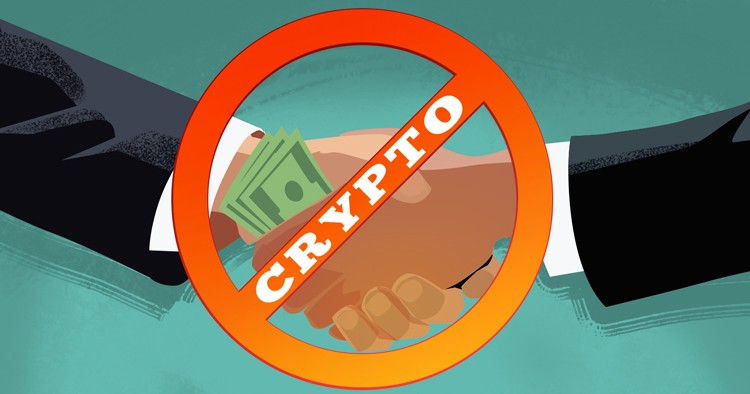Blockchain as a Means of Fighting Corruption

The German Gref and Anatoly Chubais Dispute
On January 16, during the Gaidar Forum in Moscow, the head of Sberbank, German Gref, made a loud statement. In his opinion, digitalization is the surest “medicine” that can effectively counteract corruption-related crimes in Russia. Gref’s interest in this aspect of digitalization, such as the distributed ledger technology, has been known for a long time. In November 2018, he stated that the blockchain would be applied on an “industrial scale” in a year or two, that is, the deadline for this technology to become mass is the 4th quarter of 2020. Even earlier, in September 2017, the head of Sberbank predicted that the economy would face a “giant shift” through the use of blockchain. He did not specify his forecast at that time; given his latest statement, however, Gref obviously sees the potential in using distributed ledgers to ensure higher transparency of the activities of government officials. He noted that the transition of the results of the activities of civil servants “to digital space” would allow everyone to evaluate the effectiveness of their work.
The chairman of the management board of RUSNANO, Anatoly Chubais, took the opinion of the head of Sberbank with skepticism, criticizing it on the Russia 1 TV channel. Chubais noted that the level of “the roots of this problem go much deeper” and simply cannot be solved by introducing innovations. But Gref’s opinion regarding the blockchain technology lies precisely in the fact that it cannot be used absolutely everywhere. So who is right and how can blockchain really help counteract corruption?
Russia and the United States: Corruption as a Common Problem
There are many politically motivated points on the issue of corruption that are often used to earn points from potential voters. Traditionally, many are convinced that Russia, for example, is a country with a high level of corruption—a statement that was recently reiterated by EBRD chief economist Sergei Guriev. On the other hand, one of the studies conducted by Gallup showed that 75% of Americans surveyed noted “widespread government corruption.” The survey was conducted in 2015 and attempts to find a more recent study by Gallup have not led to success. Then our editors turned to the sociological service itself. Answering the question of whether such studies have been carried out yet, Jennifer Donegan, the head of marketing communications, replied that “this was the last survey that was related to the study of the state of corruption in the United States.” It should be noted that this did not prevent the Congress of the United States from registering a bill in 2017 focused on the struggle of the Americans with the Russian, and not American corruption, which, however, remains in a “frozen” state. Be that as it may, this problem remains relevant for both Russia and the United States.
Blockchain as a Way of Reducing Corruption in the Private Sector
Is it possible to solve the problem of corruption with the help of blockchain and cryptocurrency? Ultimately, of course, not. Like any kind of crime in human society, such criminal manifestations cannot be completely ruled out. And in this, the skepticism of Anatoly Chubais regarding the role of new technologies is justified. But it is only for this aspect, and in other instances, German Gref is right. If we talk about the blockchain, it provides transparency of transactions and their higher efficiency. Those who are implementing blockchain platforms in commercial organizations have already experienced this, for example, by reducing operating costs by 40% in the oil and gas sector. And the former top manager of J.P. Morgan Chase, Blythe Masters, frankly stated that “operational and commercial practices remain inefficient and antiquated, leading to critical data omissions, security vulnerabilities, expenses, corruption, and unethical provenance,” stressing that the use of blockchain is the key to changing the situation.
Blockchain can be used in charitable organizations to reduce corruption. This was thought of, for example, in the Bill and Melinda Gates Foundation. According to the deputy director of the organization, Miller Abel, for an efficient, reliable system of collecting and distributing funds among the needy in the world, the foundation began to cooperate with the Ripple cryptocurrency company. In addition, the German state bank, KfW Bankengruppe, began testing blockchain to track how financial aid is used for Burkina Faso.
Blockchain Eliminates the Possibility of Corruption as Well as Its Negative Consequences
Corruption is a widely understood concept in the society that includes crimes in the form of both bribes and commercial bribery of representatives of legal entities. In addition, the problem of kickbacks in the commercial sector is often referred to here. Firstly, decentralized platforms can directly connect the customer and the contractor, and secondly, all the conditions agreed upon can then be easily verified: thus, it will be merely impossible to charge up the price when using the blockchain. Meanwhile, such growth in purchase prices leads to such a phenomenon as inflation, which is caused by non-market price increases. The elimination of the latter will be the main technological contribution of the blockchain to the reduction in the rate of inflation and, as a result, an increase in the wealth of the majority.
But to secure this effect, one needs to use tokens, or digital money, to make transactions as transparent as possible, unlike transactions with fiat, says an analyst of the Bank of Canada in his report. Cryptocurrencies can be the reward for all participants in a market economy for socially-encouraged actions, thereby creating additional incentives to comply with the law.
The U.N. document entitled “World Economic and Social Survey 2018” states that the use of blockchain can reduce the number of bureaucratic links and, accordingly, lower the number of crimes of a corruption nature. World Bank President Jim Yong Kim also said that blockchain could play a crucial role in combating corruption in the world.
“Blockchain Government”
Awareness of the benefits of using blockchain to reduce corruption at the country level is gradually rising. In September 2018, several organizations from the crypto industry in the Czech Republic united to introduce the distributed ledger technology “into the public sphere” of the country and help “reduce corruption” in the state. This is a private initiative. Is it possible that such a process can come from above? In the end, yes.
The state project “Open Government” operates in Russia, as well as the All-Russia People’s Front (known by its Russian initialism ONF), supported by the authorities, designed to detect cases of corruption. Considering the obvious growth of interest in the blockchain and cryptocurrencies from the political leadership of Russia, we can expect the Blockchain Government project to emerge, by analogy with the Open Government. Obviously, the first country to launch a specialized area of work on this issue from the government will create a snowball effect, and other states will follow this example.
The Blockchain Government will be beneficial primarily for the state structures themselves, as well as for the ruling party of the time. By reducing the possibility of corruption, which is especially important for the tasks of the federal government (at the regional and municipal levels, which are more difficult to control from the center), it will be possible to change the image of the government as a whole. It will also bring in financial resources that can be spent on mitigating the complex economic effects associated with the implementation of necessary social reforms such as raising the retirement age.
Blockchain: Elections, Refraining from Cash, and Crypto Pension Reform
In addition, the blockchain embedded in the electoral process will increase citizens’ confidence in the electoral procedures. On March 27, 2018, Ella Pamfilova, Chairperson of the Central Election Commission (CEC) of Russia, spoke with great enthusiasm about the technology of the distributed ledger. According to her, she planned to discuss this topic with the President since there was a public demand for this. She also stressed: “We need to be proactive. I want to make a system, this is my ambition, a system that has no analog, a system on the blockchain.” So far, indeed, there is no such thing anywhere in the world (information about holding elections on the blockchain in Sierra Leone was previously refuted by the country’s CEC), and the one who will do this first on a regular basis will indeed become a pioneer.
The next step could also be a gradual abandonment of cash in circulation and the transfer of the economy to digital money, working on the blockchain. In this case, the state treasury will receive a noticeable benefit due to a sharp decrease in the possibility of avoiding taxation. Finally, tokenization will logically lead to the issue of transition to the crypto pension system.
Who Will Take the First Step and Move from Word to Deed?
Curiously, they talked about the possibility of introducing the blockchain at the country level in a state neighboring Russia. One of the presidential candidates of Ukraine, a politician with years of experience, Yulia Tymoshenko, said on December 9, 2018, that she was going to run with the idea that blockchain would help combat corruption. The fact that Colombia can create a special authority for the introduction of blockchain for the same purpose was stated earlier by the President of this country, Ivan Duque. Obviously, a “digital determination” is needed, which will soon open the way for the real implementation of these ideas.
back home

